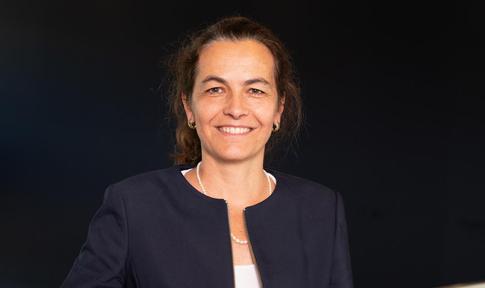XFEL: Questions and Answers with Maria Faury
Questions and Answers with Maria Faury
Maria Faury has been the chair of the European XFEL council, the highest governing body of European XFEL, since July 2018. With an engineering background, and a career in international project management, she is also Director of International Affairs and Large Research Infrastructures at the French Alternative Energies and Atomic Energy Commission (CEA) in France. During a recent visit to European XFEL, Rosemary Wilson caught up with her to talk about her career in an international environment, how she supports the next generation of engineers and scientists, and what she likes to do to recharge.
-----------------------------------------------------
How did you get interested in science?
At school I was interested in many different subjects; maths and science but also languages and philosophy. I wasn’t sure whether to go to management school afterwards or embark on a career in science and engineering. I like logical thinking, and the more involved I became with science, the more interested I became. I eventually went on to study chemistry and physics.
How important has it been for you to work in an international environment?
I always knew I wanted to work in an international environment! Growing up I lived in many different countries; USA, Spain, Venezuela, Canada and France. One of my first jobs was as a project leader on a European project on nuclear decontamination with foams. That really set the tone for my career. I find it very enriching to deal with people from different cultures, and interesting to try to understand different positions and standpoints. I don’t want to put people into boxes, but it is true that you don’t deal and negotiate in the same way in Germany and Japan. In some countries, you need time to build relationships before you can start to collaborate. But I often have encounters that don’t fit these patterns and surprise me!
How did you get involved with European XFEL?
After working at the Ministry of Research as scientific director for energy, in 2014 I returned to the French Alternative Energies and Atomic Energy Commission, CEA, as deputy director of the material science division. At this time CEA was involved in the European XFEL accelerator consortium. We were planning in-kind contributions, which had to be delivered on time. At the same time, the CEA was given the mandate to represent France at the European XFEL council. It’s been an exciting and a magnificent experience to be able to be part of a project from construction to becoming an operational user facility. Now, as head of the European XFEL council, I am no longer representing France’s interest, but ensuring that every shareholder can express themselves, while reminding everyone that we meet to make decisions for the benefit of European XFEL as an international organization.
Science and engineering are still male dominated domains. Has this been your experience?
Yes, however, I have never felt that being the only women in a male dominated field has been a problem during my career. Perhaps at times it has been an advantage. One of my first tasks as a young engineer was to translate a dismantling process I had developed in the laboratory onto a large facility scale. The first day I turned up on site to explain to the workers there what we had to do, they realized they had nowhere for women to change into safety and work gear. So they quickly organized a room for me, removing pictures of naked women on the walls. As a woman from a different research field, I was like an alien to them. But they were very kind and took time to listen to me and helped me to set up the large scale demonstration that proved to be a success. I often wonder if I was a man whether they would have tried to challenge me instead. I had a certain element of surprise.
How can we facilitate change?
Change is very slow to come. Throughout my career I have tried to support other women, and show that it is possible to harmonize family life and a successful professional career for example. I hope that by just being present and talking to students, that others will be encouraged to take similar career paths. When it comes to more senior roles, women often put so many constraints and pressure on themselves, that they will talk themselves out of applying for positions they are perfectly qualified for. In such cases, I try to reach out to women who I and my colleagues have identified as good candidates in our field, and encourage them to apply. Sometimes women need an extra nudge to take opportunities.
You have a very busy work schedule. What do you like to do to unwind?
I enjoy doing sport. I love skiing, and climbing with my son, as well as tennis and swimming. I think sport is very important to release built up stress, but also to recharge for work, and keep that balance. A healthy body makes for a healthy mind. I also try to spend as much time as I can with my family and make cherished memories. It sounds very French, but I love cooking with friends and family, enjoying a good glass of wine, and visiting vineyards!

